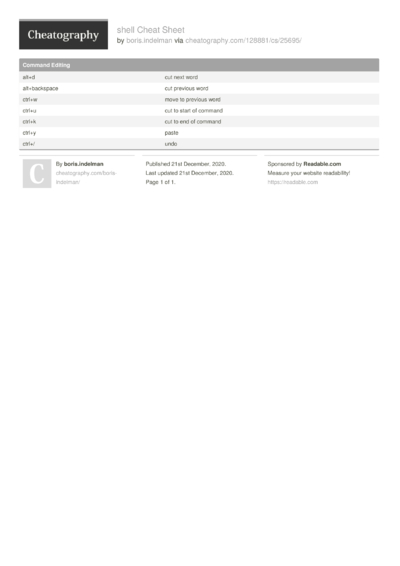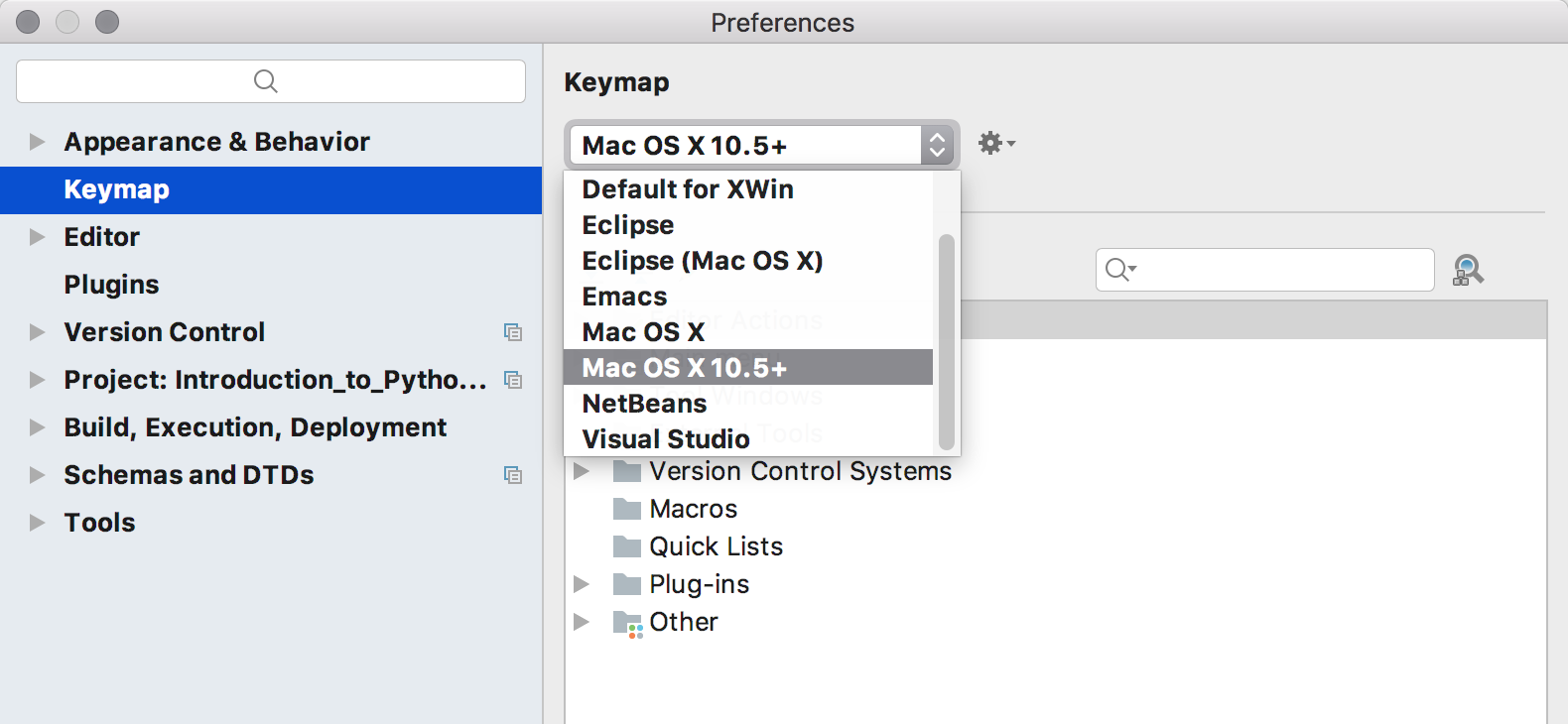Python Cheat Sheet: Python is a multi-paradigm general-purpose, object-oriented programming languageIt is a cross-platform programming language. PyCharm (By Jetbrains) Atom (Powered by GitHub) Standard Data Types in Python: Python has two types of Data types: Base Type. 1.1k votes, 70 comments. 789k members in the Python community. News about the programming language Python. If you have something to teach others.
FeaturesTips & TricksHappy Monday everyone,


Today I’m going to highlight 3 simple things you can do every day to harness the power of PyCharm and steadily increase your productivity.
1. PyCharm Productivity Guide
PyCharm smartly analyzes the features you use most often during your development sessions, and alerts you to some features you may have missed.
The Productivity Guide dialog is available in Help | Productivity Guide, displaying the list of features with usage statistics and tips:
Besides analyzing your personal usage of features, you can discover other similar features that you have yet to try. Simply sort features by Group, and look for unused ones next to the frequently used. For a quick hint on how to use a feature, select it and see the tips below.
2. Keyboard Shortcuts You Cannot Miss
PyCharm is no Vim or Emacs, but you can still do a lot using just your keyboard. As a keyboard-centric IDE, PyCharm has keyboard shortcuts for most of its commands. Here’s a short list of indispensable shortcuts you can’t afford to miss:

| Shortcut | Description |
| Ctrl+Shift+A | Find action by name |
| Double Shift | Search Everywhere |
| Alt+Enter | Show the list of available intention actions |
| Alt+F1 | Switch between views (Project, Structure, etc.) |
| Ctrl+Tab | Switch between the tool windows and files opened in the editor |
| Alt+Home | Show the Navigation bar |
| Ctrl+J | Insert a live template |
| Ctrl+Alt+J | Surround with a live template |
| F4 | Edit an item from the Project or another tree view |
| Ctrl+Slash Ctrl+Shift+Slash | Comment or uncomment a line or fragment of code with a line or block comment |
| Ctrl+N Ctrl+Shift+N | Find class or file by name |
| Ctrl+D | Duplicate the current line or selection |
| Ctrl+W and Ctrl+Shift+W | Incremental expression selection |
| Ctrl+F | Find text string in the current file |
| Ctrl+Shift+F | Find text in the project or in the specified directory |
| Ctrl+Shift+F7 | Quickly view the usages of the selected symbol |
| Ctrl+NumPad Plus Ctrl+NumPad – | Expand or collapse a code block in the editor |
| Ctrl+Space | Invoke code completion |
For the detailed list of default keyboard shortcuts, see the Keyboard Shortcuts Reference. If you’d like to customize your preferred keymap, refer to the Configuring Keyboard Shortcuts sections.
The default keymap reference is also available as a PDF. To view it, select Help | Default Keymap Reference in the main menu:
You may want to print out this ‘cheat sheet’ and keep it handy, to discover new shortcuts as you go along and get to know PyCharm better.
3. Tips of the Day
One of the most adored features among PyCharm users is Tip of the Day. Tips of the Day provide a huge collection of useful and interesting hints. They show up every time you start PyCharm. If you’ve suppressed these tips before, you can always get them back by going to Help | Tip of the Day and selecting the Show Tips on Startup check-box:
I hope you enjoy learning your way around PyCharm and using its numerous features to boost your productivity. It’s an investment that will definitely pay off.
Talk to you next week,
-Dmitry
- MacOS
Jump to: General Shortcuts, Find and Replace, Debugging, Compile and Run, Navigation, Editing, Refactoring, Usage Search, Live Templates, VCS/Local History
Alt+0.9 | Open Corresponding Tool Window |
Ctrl+S | Save All |
Ctrl+Alt+Y | Synchronize |
Ctrl+Shift+F12 | Toggle Maximize Editor |
Ctrl+Shift+A | Find Action |
Esc | Go to Editor |
Ctrl+Tab | Switch Editor Tabs and IDE Tool Windows |
Ctrl+Alt+S | Open Setting Dialog |
Ctrl+` | Quick Switch Current Scheme |
Alt+Shift+F | Add to Favourites |
Alt+Shift+I | Inspect Current file with Current file |
Ctrl+F | Find |
Ctrl+R | Replace |
F3 | Find Next |
Shift+F3 | Find Previous |
Ctrl+Shift+F | Find in Path |
Ctrl+Shift+R | Replace in Path |
Alt+F9 | Run to Cursor |
Shift+F8 | Step Out |
F8 | Step Over |
F7 | Step Into |
Ctrl+Alt+F8 | Quick Evaluate Expression |
Alt+F8 | Evaluate Expression |
Ctrl+F8 | Toggle Breakpoint |
Ctrl+Shift+F8 | View Breakpoints |
F9 | Resume Program |
Pycharm Shortcuts Cheat Sheet Pdf Mac
Alt+Shift+F10 | Open Run Configuration |
Alt+Shift+F9 | Open Debug Configuration |
Shift+F10 | Run |
Shift+F9 | Debug |
Ctrl+Shift+F10 | Run Context editor from Editor |
Ctrl+N | Go to Class |
Ctrl+Shift+N | Go to File |
Ctrl+Alt+Shift+N | Go to Symbol |
F2 | Next highlighted Error |
Shift+F2 | Previous highlighted Error |
Ctrl+PgUp | Go to Top of Page |
Ctrl+PgDn | Go to Bottom of Page |
Ctrl+G | Go to Line |
Ctrl+E | Recent files Popup |
Select current file/Symbol in any View | |
Alt+Left Arrow/Alt+Right Arrow | Go to Next/Previous Tab |
Ctrl+B | Go to Declaration |
Ctrl+Shift+B | Go to Type Declaration |
Ctrl+Alt+Left Arrow/Ctrl+Alt+Right Arrow | Navigate back/forward |
Ctrl+Shift+Backspace | Go to last edit location |
Ctrl+U | Go to super method/super class |
Ctrl+H | Type Hierarchy |
Ctrl+Shift+H | Method Hierarchy |
Ctrl+Alt+H | Call Hierarchy |
Ctrl+F12 | File Structure Popup |
F12 | Go back to Previous Tool Window |
F11 | Toggle Bookmark |
Ctrl+F11 | Toggle Bookmark with Mnemonic |
Shift+F11 | Show Bookmarks |
Ctrl+0.9 | Go to Numbered Bookmark |
Alt+Home | Show Navigation bar |
F4 | Edit Source |
Ctrl+Shift+Alt+U | Show Diagram |
Ctrl+]/Ctrl+[ | Move to code block end/start |
Alt+Up Arrow/Alt+Down Arrow | Go to Previous/Next Method |
Ctrl+Shift+I | Open Quick Definition Lookup |
Ctrl+Spacebar | Basic Code Completion |
Ctrl+Shift+Enter | Complete Current Statement |
Ctrl+Alt+Spacebar | Class name Completion |
Ctrl+Q | Quick Documentation Lookup |
Ctrl+Mouse Over | Brief Info |
Ctrl+Shift+Enter | Complete Statement |
Ctrl+P | Parameter Information |
Ctrl+O | Override Methods |
Alt+Insert | Generate Code |
Ctrl+Shift+Up Arrow/Down Arrow | Move Line(Selection) Up/Down |
Ctrl+Alt+T | Surround With.(Begin.End etc.) |
Ctrl+/ | Comment/Uncomment with Line Comment |
Ctrl+Shift+/ | Comment/Uncomment with Block Comment |
Ctrl+F1 | Show Description of Error or Warning at Caret |
Tab | Indent Selected Lines |
Shift+Tab | Unindent Selected Lines |
Alt+Enter | Show Intention Actions and Quick Fixes |
Ctrl+Alt+L | Reformat Code |
Ctrl+D | Duplicate Current Line |
Ctrl+X/Ctrl+C/Ctrl+V | Cut/Copy/Paste Current line to Clipboard |
Ctrl+Shift+V | Paste from Buffer |
Ctrl+Alt+I | AutoIndent Lines |
Ctrl+Y | Delete line at caret |
Shift+Enter | Start New line |
Ctrl+F4 | Close Active editor tab |
Alt+Enter | Show Intention Actions/Quick-Fixes |
Ctrl+Shift+W | Decrease Current Selection to Previous State |
Ctrl+W | Select Successively Incresing Code blocks |
Ctrl+Shift+NumPad + | Expand All |
Ctrl+Shift+NumPad - | Collapse All |
Ctrl+NumPad +/Ctrl+NumPad - | Expand/Collapse Code block |
Ctrl+Del | Delete to end word |
Ctrl+Backspace | Delete to word start |
Ctrl+Shift+] | Select till code block end |
Ctrl+Shift+[ | Select till code block start |
Shift+Alt+U | Toggle Carnel/Snake Case |
Ctrl+Shift+U | Switch case for Word at Caret or Selected block |
F5 | Copy |
F6 | Move |
Alt+Del | Safe Delete |
Shift+F6 | Rename |
Ctrl+Alt+N | Inline |
Ctrl+F6 | Change Signature |
Ctrl+Alt+M | Extract Method |
Ctrl+Alt+F | Introduce Field |
Ctrl+Alt+P | Introduce parameter |
Ctrl+Alt+C | Introduce Constant |
Ctrl+Alt+V | Introduce Variable |
Ctrl+F7 | Find Usage in File |
Alt+F7 | Find Usage |
Ctrl+Shift+F7 | Highlight Usage in File |
Ctrl+Alt+F7 | Show Usage |
Ctrl+J | Insert Live Template |
Ctrl+Alt+J | Surround with Live Template |
Pycharm Cheat Sheet
Ctrl+K | Commit Project to VCS |
Ctrl+T | Update Project from VCS |
Ctrl+Shift+E | View Recent Changes |
Alt+` | VCS Operations Popup |
Created by rank17 on 4/26/2017. Last updated by admin on 6/16/2017
Pycharm Shortcuts Pdf
0 Comments for 'PyCharm '

